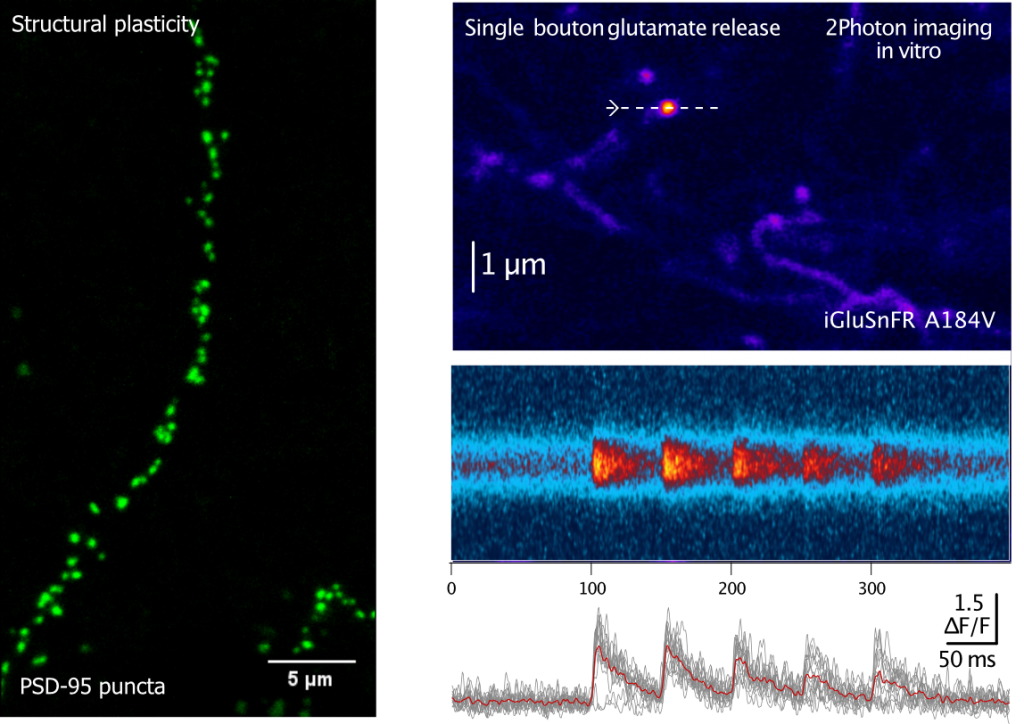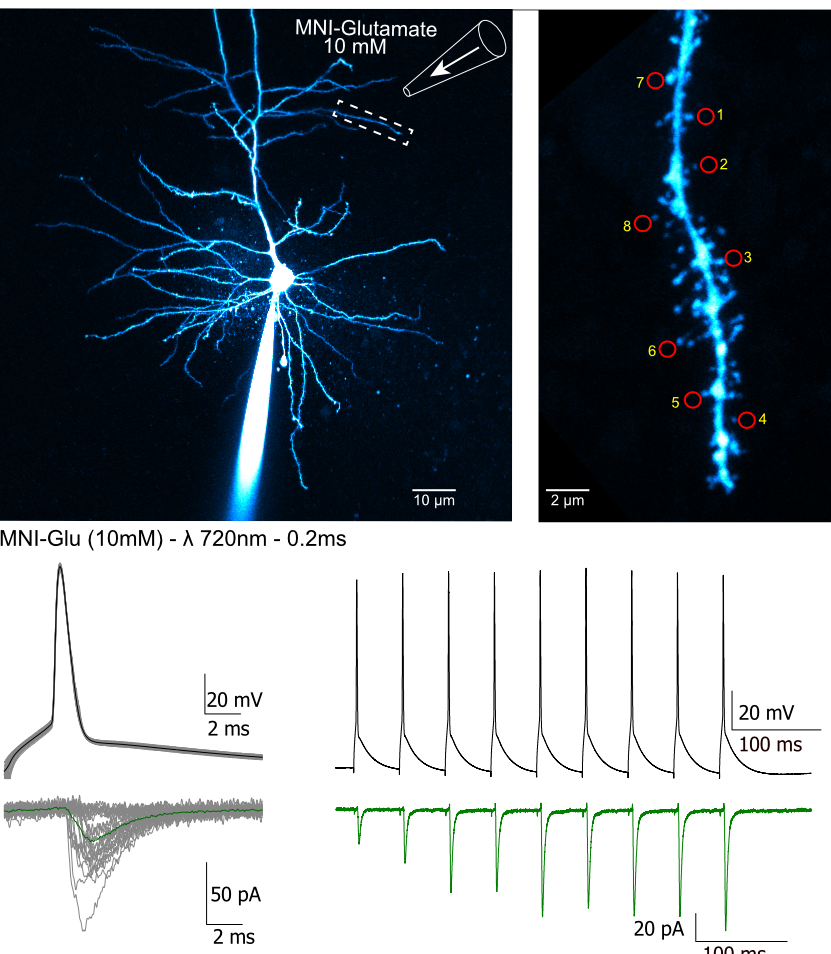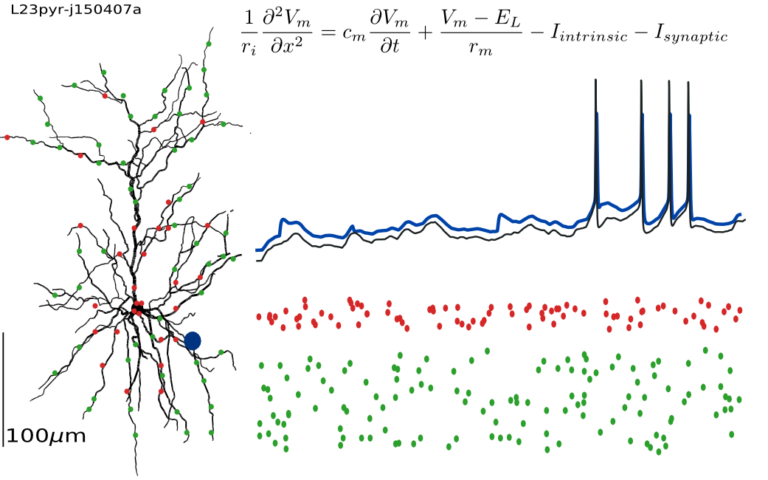RESEARCH:
The human brain is composed by millions of neurons that communicate with each other using an even greater number of synapses. An open question is how those neurons with all its connections give rise to most of animal and human behavior? In the lab we investigate the cellular and network mechanisms at the origin of sensory perception.
From the drowsiness of a daydreaming commuter in his suburb train, to the heightened vigilance of a rock climber executing a difficult move, sensation during wakefulness takes place under drastically different conditions, themselves associated to various perceptual outcomes. A remarkable property of sensory systems is therefore to provide a flexible strategy to process afferent information in a context-dependent manner. Such a flexibility in the computation of incoming signals appears to be a key feature of cortical processing in the healthy brain. Indeed, reduced context-dependent sensory processing and adaptability underlies several brain disorders like Schizophrenia and Depression. Yet, the combination of circuit and cellular features shaping such modulations is still poorly understood.
In the lab we use a multidisciplinary approach, involving, electrophysiology, brain imaging (two-photon), optogenetics both in vivo and in vitro as well as computer modeling to understand how neuronal networks process sensory information and how this process is influenced by context. Working in the primary visual and somatosensory cortex of mice we try to identify previously unnoticed cellular mechanisms that are essential for information processing by the brain.
Our goal is also to investigate how such cellular mechanisms are modified or altered in the pathological brain and eventually uncover new molecular targets with potential therapeutical value.
Experimental Approaches:


In vivo two-photon calcium imaging

Numerical simulations
Single cell activity and Network Dynamics during Behaviour
Join Us
In the Lab we are highly motivated to pursue scientific excellence and rigor. Always under a highly collaborative atmosphere. Scientific research is challenging and not always easy but can be highly rewarding in that particular moment where working hypothesis became reality. Nothing better than to share that first excitement with your lab colleagues in an hostility-free lab environment. We have open positions for Master students, PhD students and Postdoctoral researchers.
We are always looking for talented people to join the team! Get in touch at nelson.rebola@icm-institute.org, attach your CV and give us a short explanation on your interest in joining the lab.
PAris Brain Institute (ICM) – Pitié-Salpêtrière Hospital
We are Hiring: Postdoctoral Position Available
Postdoctoral position to study cortical microcircuits involved in sensory processing at the Paris Brain Institute.
We are seeking to recruit as soon as possible talented and motivated post-doctoral fellows with experience in brain neurophysiology that love science and are fascinated by synapses and neuronal circuits.
Location: The Rebola Lab (https://therebolalab.org/) seeks for a highly motivated Postdoctoral fellow to join our team at the Paris Brain Institute, Paris, France. Starting date April 2025-December 2025
Project: The project aims at investigating the cellular and molecular mechanisms involved in the processing of sensory information in the neocortex. The work will mainly focus on the primary visual cortex (V1) and will combine the use of visual stimulation, optogenetics, genetically encoded sensors (e.g. GCaMPs, iGluSnFR3, among others) together with in vivo two-photon imaging and or in vivo electrophysiological recordings e.g. Neuropixels). The laboratory’s research primarily focuses on understanding how variability in synapse function among the different cellular components of cortical microcircuits contributes to the encoding of visual information. Special attention is devoted to investigate how the specification of synaptic function and integration contributes to the unique functional properties of the distinct populations of interneurons in the neocortex and ultimately control processing of visual information (see publications).
Profile: The position will be financed for a minimum of two years. For this position, we are seeking highly motivated individuals with experience in neurophysiology. Candidates with a PhD in Neuroscience or related discipline and demonstrated expertise with two-photon imaging, in vivo recordings and/or computational skills are highly encouraged to apply. Starting date is scheduled to 1/01/2024 but can be adjusted.
Interested candidates should submit a statement of research experience and career goals, a current CV and 2 reference letters to: nelson.rebola@icm-institute.org
Key Publications:
- 1. Bossi and Dhanasobhon et al., Neuron. 2022 Aug 3;110(15):2438-2454.e8
- 2. Morabito A et al, Cell Rep. 2022 Feb 22;38(8):
- 3. Rebola N*, Reva M* et al., Neuron 2019, Neuron. 2019 Nov 20;104(4):693-710.e9.
- 4. Rebola N, Carta M, Mulle C, Nat. Rev. Neurosci. 2017 Apr;18(4):208-220.
- 5. Vergnano AM*, Rebola N*, Savtchenko L*, et al., Neuron 2014, 82(5):1101-14
- 6. Carta M*, Lanore F*, Rebola et al., Neuron. 2014, 81(4):787-99.
- 7. Rebola N et al., Nature Neurosci. 2011Jun.;14(6):691–3.
- 8. Rebola N et al. Neuron. 2008 Jan.;57(1):121–34.